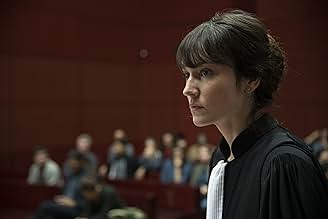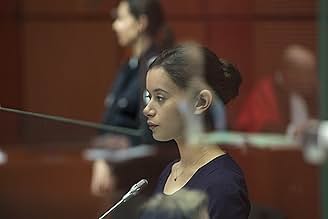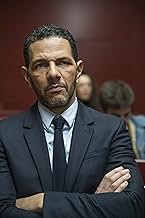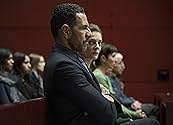VALUTAZIONE IMDb
6,6/10
2631
LA TUA VALUTAZIONE
Lisa è una adolescente di diciotto anni con un braccialetto elettronico alla caviglia che viene processata per aver ucciso la sua migliore amica.Lisa è una adolescente di diciotto anni con un braccialetto elettronico alla caviglia che viene processata per aver ucciso la sua migliore amica.Lisa è una adolescente di diciotto anni con un braccialetto elettronico alla caviglia che viene processata per aver ucciso la sua migliore amica.
- Regia
- Sceneggiatura
- Star
- Premi
- 3 vittorie e 5 candidature totali
Pascal Garbarini
- Le Président du Tribunal
- (as Pascal-Pierre Garbarini)
Recensioni in evidenza
Completely free of any dramatic tension, a girl is tried for the murder of her best friend. The difference between an adversarial and inquisitorial justice system makes interpretation of the process a bit challenging but the prosecutor seemed to be saying since you can't prove it wasn't you it must have been you. All the old tropes of "she wasn't a virgin so she must have been a murderer" We've all seen Spiral so we know about investigating magistrates so it's still difficult to understand how this one made it to trial
I usually find with French courtroom dramas a refreshing lack of formality and deference. That's not to say that it's a free for all, but the ebbing and flowing of testimony and barrister intervention seems to me far more likely to facilitate a more accurate verdict. "Lise" (Melissa Guers) has been arraigned on a charge of the murder of her best friend "Flora". She was found stabbed multiple times in a bed they had shared the night before. The prosecutor (Anaïs Demoustier) is alleging that a leaked, intimate, video of "Lise" and their friend "Nathan" (Mikaël Halimi) was the source of the violence but she denies that. As the investigation proceeds, we begin to realise that nothing is simple here. "Lise" turns out to be a sexually active girl and the trial sort of shifts from an evaluation of her guilt and innocence into one of youth, profligacy, morals and behaviour. At that, it's quite provocative and the young Guers delivers well. She portrays the character convincingly, lacking in confidence and emanating quite a genuine sense of bemused bewilderment coupled with a remarkable degree of self-control. It's quite clear that as her parents learn a little more of their daughter's peccadilloes that they, too, have demons to face - and at times you do wonder if her dad "Bruno" (Roschdy Zem) is entirely sure of her innocence. Annie Mercier is also quite effective as the girl's legal counsel presenting a far less confrontational style then the prosecutor and for the bulk of this ninety minutes, we have quite a decent drama that does ask you not just whom you believe, but also - what were you like at that age. The trial itself seems a little weak, but as a vehicle for quite a characterful performance from Guers it's worth watching.
Firstly contrary to another review, there was *no* goof in presenting photos of the murder scene and the cuts sustained by the victim. Two separate photos were shown to the court: the first was of the murder scene with blood on the sheets and spatter on the wall: the second was what looked like a post-mortem photo showing the position of the cuts. The latter was never presented as having been taken at the scene.
On my impressions of the film, the whole court scene felt very realistic and yet shocking at the same time. How was it that the prosecution was able to inject so much surmise, inuendo and downright personal opinions without being challenged and such statements being struck from the record? Of course this is fiction, but I sincerely hope it does not represent how court cases are conducted in France!
If I speak strongly it's because the acting throughout was excellent, very naturalistic, from Lise through to her family and her lawyer. Not having seen the original film but read that in it the prosecution relies heavily on besmirching the character of the accused, that same tone was very much reflected in this film. I was gripped throughout.
On my impressions of the film, the whole court scene felt very realistic and yet shocking at the same time. How was it that the prosecution was able to inject so much surmise, inuendo and downright personal opinions without being challenged and such statements being struck from the record? Of course this is fiction, but I sincerely hope it does not represent how court cases are conducted in France!
If I speak strongly it's because the acting throughout was excellent, very naturalistic, from Lise through to her family and her lawyer. Not having seen the original film but read that in it the prosecution relies heavily on besmirching the character of the accused, that same tone was very much reflected in this film. I was gripped throughout.
Near to the start, the victim's mother describes huge amounts of blood. With only the face being spared a savage attack. But during the trial, the scene-of-crime photos show no sign of any blood at all; just a few neat wounds. This dichotomy is so extreme that this viewer was entirely distracted from watching the remainder of the movie with any interest. What did it mean? Was it some sort of 'high art' concept? Was it the start of some sort of science fictional adventure? Do the French police wash bodies, launder bed-clothes and wash walls before taking a literally sanitized picture? What does it mean?
Somewhere among the end titles we are informed that the script by director Stéphane Demoustier has been "librement adapté du scénario original de Acusada écrit par Gonzalo Tobal and Ulises Porra Guardiola." In fact, this film is a remake of Acusada (The Accused) a 2018 Argentine movie.
The subject in both movies is the trial of the post-adolescent daughter of upper middle class parents as the main suspect in the murder of her best friend. The depiction of the trial, however, is different. In Acusada, the point was to show that truly competent/unscrupulous lawyers (generally, only accessible to the rich) can confuse the issues in a criminal trial, using all means at their disposal including the news media. The resulting uncertainty makes a reasonable verdict unlikely, which brings to mind real life examples such as O. J. Simpson's trial. In this movie. however, lawyers' behavior is unimpeachable and not the source of the uncertainty at the end. Another (minor) difference is that in Acusada the verdict is decided by a panel of judges (as customary in Argentina) rather than by a jury as in France and many other countries. Finally, episodes that were creepy in Acusada are toned down here.
This said this movie (remake or not) deserves a viewing. Lisa, the accused, is played to perfection by Melissa Guers. Except for television interviews this is her only acting credit so far and most likely the beginning of a brilliant career. Roschdy Zem and Chiara Mastroianni show their usual excellence as Lisa's parents, and so does Anaïs Demoustier as the prosecuting attorney. Script and direction are smooth and seamless. The differences with Acusada may justify to tell the story a second time.
The subject in both movies is the trial of the post-adolescent daughter of upper middle class parents as the main suspect in the murder of her best friend. The depiction of the trial, however, is different. In Acusada, the point was to show that truly competent/unscrupulous lawyers (generally, only accessible to the rich) can confuse the issues in a criminal trial, using all means at their disposal including the news media. The resulting uncertainty makes a reasonable verdict unlikely, which brings to mind real life examples such as O. J. Simpson's trial. In this movie. however, lawyers' behavior is unimpeachable and not the source of the uncertainty at the end. Another (minor) difference is that in Acusada the verdict is decided by a panel of judges (as customary in Argentina) rather than by a jury as in France and many other countries. Finally, episodes that were creepy in Acusada are toned down here.
This said this movie (remake or not) deserves a viewing. Lisa, the accused, is played to perfection by Melissa Guers. Except for television interviews this is her only acting credit so far and most likely the beginning of a brilliant career. Roschdy Zem and Chiara Mastroianni show their usual excellence as Lisa's parents, and so does Anaïs Demoustier as the prosecuting attorney. Script and direction are smooth and seamless. The differences with Acusada may justify to tell the story a second time.
Lo sapevi?
- QuizAnaïs Demoustier, who plays the prosecutor, is the director's sister. Chiara Mastroianni, who plays Lise's mother, is the daughter of Marcello Mastroianni and Catherine Deneuve.
- ConnessioniRemake of Acusada (2018)
I più visti
Accedi per valutare e creare un elenco di titoli salvati per ottenere consigli personalizzati
- How long is The Girl with a Bracelet?Powered by Alexa
Dettagli
- Data di uscita
- Paesi di origine
- Sito ufficiale
- Lingua
- Celebre anche come
- The Girl with a Bracelet
- Luoghi delle riprese
- Palais de justice, Nantes, Loire-Atlantique, Francia(courthouse exterior and interior locations)
- Aziende produttrici
- Vedi altri crediti dell’azienda su IMDbPro
Botteghino
- Budget
- 3.300.000 € (previsto)
- Lordo in tutto il mondo
- 2.593.818 USD
- Tempo di esecuzione1 ora 35 minuti
- Colore
- Proporzioni
- 1.66 : 1
Contribuisci a questa pagina
Suggerisci una modifica o aggiungi i contenuti mancanti

Divario superiore
What is the German language plot outline for La ragazza con il braccialetto (2019)?
Rispondi
![Guarda Bande-annonce [VO]](https://m.media-amazon.com/images/M/MV5BZTBlZWVmZGMtZGJlZi00OWEwLTgzM2ItM2E4ZTIwNWUxNzUxXkEyXkFqcGdeQXRyYW5zY29kZS13b3JrZmxvdw@@._V1_QL75_UX500_CR0)
























